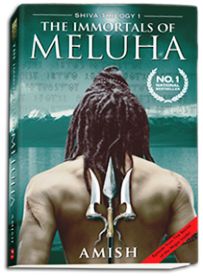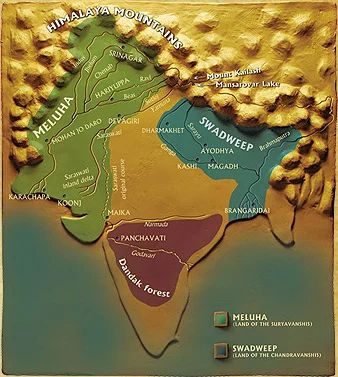The Immortals Of Meluha
Aug 21, 2019 • 353 views
Author
Amish Tripathi, evidently has been delving into the world of mythology and contemporary fiction.
He comes from a middle class background that encourages religious thinking. Infact, his grandfather was a Pandit and a teacher at the very well known Banaras Hindu University.
Plot
Set amidst the Indus Valley Civilization , Amish Tripathi weaves the transformation of the 'Neelkanth' from a man belonging to yet another tribe in the Tibetan Lands to a God figure, the Mahadev! The first book of the trilogy has a lot more for you than just it's tag of being a huge commercial success. The sequels to follow are The Secret of the Nagas, and The Oath of the Vayuputras.
Shiva's journey
There are a number of instances that subtly incorporate the ways this man made entirely of his Karma, has certainly devoted his life to stand for his tribe, the Guna's. His tribe has not just addressed him as their Leader but also actively contributed to his position while taking due care of the respect and devotion they have for the Shiva!

Book Cover-Source: LibraryMantra
Supporting characters
It is evident that Shiva was indeed a great leader, when he left the land of his origin, his cottage near Mount Kailash by the banks of Mansarovar, to make peace with the Pakratis.
We also witness his grounded nature, when he decides to leave the Pakratis, though unarmed, despite of having possible threats from the Pakratis, on being adviced by the Meluhan representative, Nandi!
There's a lot to find in the Library of Indian Mythological Fiction, but 'the immortals of meluha' will remain the one of its kind.
You will find a very close correlation between facts and blends of fiction. The simple and lucid language has made it althemore easy for the reader to flow into the story's nuances.
The story also interweaves the plots of the Saptrishis and Vasudevas.
Rudras and Devas are also found to have briefedaccounts of their history through the course of the book and that too with utmost simplicity!
The role of Suryavanshi's, Chandravanshi's and Daksha are explained with great patience. The encounter of Nandi and Veerbhadra with Princess Sati was one of the appreciable moments in the story. Ayurvati, Kanakhala, Brahaspati and Parvateshwar were other characters that were also well considered andencompassed in Amish's construction.
Insights...
Critical Reception
The characters have all been taken care of by Amish, without putting the readers in any sort of ambiguity.
But what was criticised about one of the most acclaimed works of his, was the fact that this book (certainly his debut) at various instances witnessed punches of forced humour, frankly.
Also, the attempt to show a huge gap between the 'Ram' and 'Shiva', while we know factually that 'Hanuman' was himself a later avatar of Shiva - was not quite truly a winning situation!
The magnitude of mythological resources at Amish's disposal made the readers feel that he could be a bit more descriptive in his work, rather than exaggerating the - 'already-dramatic-perspective'.
However, the real win was the way things become easier to visualise with every passing page of the book.
Strengths of the book
From the dissection of his popular art form, the Tandava to the whole process of how he made the Suryavanshi army to believe "Har Har, Mahadev!" is definitely worth a read.
Not only the Tandava, the intoxicating fumes of chillum and the signature Dumru of the Shiva have also been illustrated, perhaps, as comprehensively well as it can get!
Some keen literature readers have although criticised the book for making things look a bit too generic, the bhaktas are certain to find it a page-turner.
These three hundred and ninety pages may sound overwhelming to some, are appreciated by a good number of beginners!
Tripathi believes " Myths are nothing but jumbled memories of a true past. A past buried under mounds of earth and ignorance. " and this reflects in his works for sure!
The characters are born from the Hindu texts and also Tripathi's imaginations which may not come across as classical and traditional as they really are, for some readers.
Geographical Account
The various locations that the story demands have been explained well and taken great care of.

Map of the locations used in the novel -Source- HobbyLark
Kingdoms and empires such as those of the Dandaka forest, the Swadweep and the quite obvious, Meluha are just beautifully portrayed.
The commercial hit has been translated into various languages including - English (South Asia), Hindi, Marathi, Bengali, Gujarati, Assamese, Malayalam, Telugu, Kannada, Bahasa Indonesian, Tamil, English (UK), Estonian and Spanish.
Popular reviews
Many eminent influencers have also given their opinions on the book.
‘I was blown away with the world of Meluha and riveted by Amish’s creation of it.’ – Karan Johar, renowned filmmaker
Popular organisations also appreciated the book for what it was and how it came across!
‘Shiva rocks. Just how much Shiva rocks the imagination is made grandiosely obvious in The Immortals of Meluha. […] Shiva’s journey from cool dude […] to Mahadev […] is a reader’s delight. […] What really engages is the author’s crafting of Shiva, with almost boy-worship joy.’ – The Times of India
Synopsis...
Athough there have been many questions that surround 'the immortals of meluha' and Amish Tripathi, this book is an apt definition of Contemporary Literature.
People are fascinated by how it relates to the modern scenario while underlining most aspects of the history.
My view...
"All in all, it has been a much fulfilling read for most people and controversial for some."
More about the author-
Born on 18 October 1974 in Mumbai, India, Amish Tripathi, wanted to study history as it is one of his favourite subjects, however he couldn't follow it up due to his financial struggles. He graduated from St. Xavier's College Mumbai, in science.He later did his MBA from IIM, Calcutta.
His other works include-
Ram: Scion of Ikshvaku
Immortal India: Articles and Speeches…
Raavan: Enemy of Aryavarta
Sita : Warrior of Mithila…
Unbridled Shakti
Suheldev & the Battle of Bahraich - A Preview
